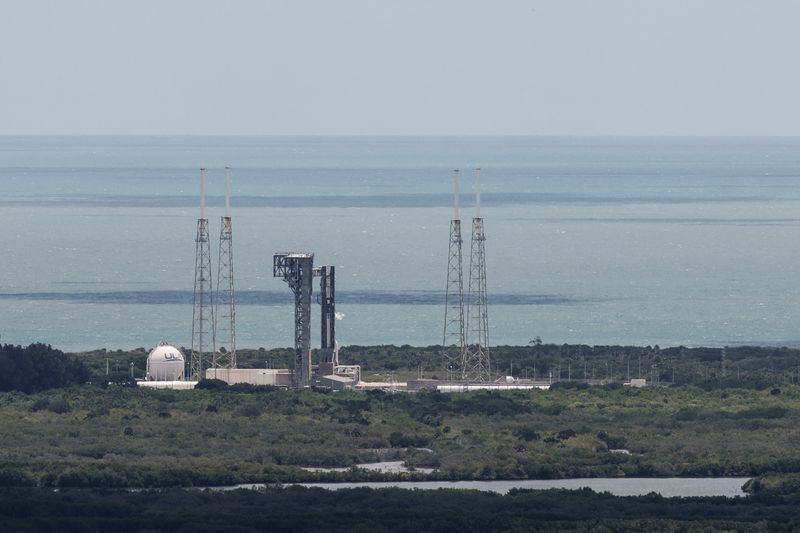By Joey Roulette and Steve Gorman
CAPE CANAVERAL, Florida (Reuters) -The launch countdown for Boeing (NYSE:)'s new Starliner space capsule on its inaugural crewed test flight was halted on Saturday for the second time in weeks due to an unspecified technical issue, postponing the mission for at least another 24 hours.
The CST-200 Starliner's first voyage carrying two astronauts to the International Space Station (ISS) has been highly anticipated and much-delayed as Boeing scrambles to gain a greater share of the lucrative NASA business now dominated by Elon Musk's SpaceX.
The gumdrop-shaped Starliner capsule had stood poised for blastoff from NASA's Kennedy Space Center in Florida atop an Atlas (NYSE:) V rocket furnished by United Launch Alliance, a Boeing-Lockheed Martin joint venture.
But less than four minutes prior to liftoff, a ground system computer triggered an automatic abort command that paused the countdown clock, according to mission officials.
It was not immediately clear why the abort command was activated or how long the underlying issue would take to address. But the next available launch window for the mission is Sunday at about noon local time, followed by two more opportunities on Wednesday and Thursday.
The first attempt by Boeing to send an uncrewed Starliner to the space station in 2019 failed due to software and engineering glitches. A second try in 2022 succeeded, paving the way for efforts at getting the first crewed test mission off the ground.
A May 6 countdown was halted just two hours before launch time over a faulty pressure valve on the Atlas upper stage, followed by weeks of further delays caused by other engineering problems, since resolved, on the Starliner itself.
The two-member crew, NASA astronauts Barry "Butch" Wilmore, 61, and Sunita "Suni" Williams, 58, had been strapped into their seats aboard the spacecraft for a couple of hours before launch activities were suspended on Saturday.
Technicians assisted the astronauts out of the capsule safely about an hour after the flight was scrubbed.
It is not uncommon in the space industry for countdowns to be halted at the 11th hour and for launches to be postponed for days or weeks, even when seemingly minor malfunctions or unusual sensor readings are detected, especially in new spacecraft flying humans for the first time.
BOEING OFFERS NASA 2ND CREW-LAUNCH OPTION
Boeing, whose commercial plane operations are in disarray after several crises, badly needs a success in space for its Starliner venture, a program several years behind schedule with more than $1.5 billion in cost overruns.
While Boeing has struggled, SpaceX has become a dependable taxi to orbit for NASA, which is backing a new generation of privately built spacecraft that can ferry astronauts to the ISS and in the future, under its ambitious Artemis program, to the moon and eventually Mars.
Starliner would compete head-to-head with SpaceX's Crew Dragon capsule, which since 2020 has been NASA's only vehicle for sending ISS crew to orbit from U.S. soil.
The flight would mark the first crewed voyage to space using an Atlas rocket since the storied family of Atlas launch vehicles first sent astronauts, including John Glenn, on orbital flights for NASA's Mercury program in the 1960s.
Once launched, the capsule is expected to arrive at the space station after a flight of about 26 hours and dock with the orbiting research outpost some 250 miles (400 km) above Earth.
Plans call for the two astronauts to remain at the space station for about a week before riding the Starliner back to Earth for a parachute and airbag-assisted landing in the U.S. Desert Southwest, a first for crewed NASA missions.
The test flight comes at an especially critical moment for Boeing. Its airplane business is dealing with fallout from a midair blowout of a cabin panel door plug on a nearly new 737 MAX 9 in January, as well as previous deadly crashes of two 737 MAX jets.
Getting Starliner to this point has been a fraught process for Boeing under a $4.2 billion fixed-priced contract with NASA that has since swelled to roughly $4.5 billion, according to a Reuters review of contract changes since it was awarded in 2014.

The space agency wants the redundancy of having two different U.S. rides to the ISS, which is expected to retire around 2030. NASA is encouraging private development of new space stations that could replace the ISS after its retirement, potentially giving Starliner new destinations.
Depending on the outcome of the first crewed test flight, Starliner is booked to fly at least six more crewed missions to the space station for NASA.
Colossal $2.53 Billion Bitcoin Withdrawal Stuns Major Exchanges By U.Today
Modi's alliance to win big in India election, exit polls project By Reuters
Related News



